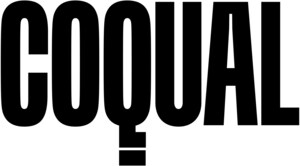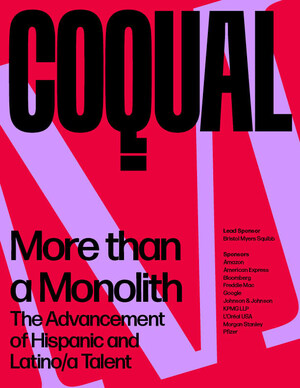NEW YORK, Oct. 6, 2021 /PRNewswire/ -- Companies around the globe have responded to the demand for change to address social and racial inequities, pledging billions of dollars and making sweeping promises. Corporations want to drive fairness in the workplace and create sustainable change but rarely know what will best achieve that goal. Equity, defined by Merriam-Webster as "fairness or justice in the way people are treated," is the focus of Coqual's (formerly Center for Talent Innovation), new research study, Equity at Work: Fulfilling Its Promise through Process, published today.
A global nonprofit think tank, Coqual's first report in a three-part series takes an in-depth look at key processes that determine professionals' career outcomes: performance evaluations, promotions, and pay. The report uncovers the practices that promote feelings of fairness among employees of different backgrounds and provides actionable solutions for companies and their leaders to create equitable workplaces for all.
"Equity is vital to a company's success and Coqual is committed to helping leaders tear down norms, dismantle current systems and rebuild them from the ground up," said Lanaya Irvin, Coqual chief executive officer. "Our study provides intersectional insights, data, and tools to navigate the process."
"We are deeply committed to building equity in the workforce and that's why we're proud to be the lead sponsor of Coqual's research on this important topic. This report provides the critical insights and tools needed to create a fair working environment for everyone," said Melonie Parker, Chief Diversity Officer, Google.
In this study, HR practitioners cite promotions as the biggest area of inequity within their organizations, yet their biggest area of focus remains locked on hiring. Hiring can seem like a quick solution, but without resources dedicated to the promotion and retention of current employees of all backgrounds, the results rarely last.
"It's time to truly understand the ways in which the workplace doesn't work for all," said Pooja Jain-Link, Coqual executive vice president, and primary research lead for the study. "Structural change is difficult, and racial equity requires more than just momentum; it requires massive culture change. Companies must allocate the necessary resources to change the current systems of power to make them equitable. They have to look beyond recruiting and hiring, deeper into the talent lifecycle."
Performance Evaluations
Performance evaluations are crucial to an individual's career, but Coqual's study found not everyone is assessed fairly. More than one in five Black men and more than one in six Latinx men say they were evaluated on different criteria than their peers. Asian professionals are the least likely of any group to feel their evaluations reflect their contributions. Among Latinx professionals, Coqual finds colorism plays a role in creating inequity in performance evaluations – those with lighter skin are 57% more likely than those with darker skin to say their evaluations reflect their contributions to the company. Veterans don't always feel they're being evaluated fairly at work: they are nearly four times as likely as non-veterans to say they are evaluated on different criteria from others at their job level and are nearly 2.5 times as likely to say they are evaluated more harshly than their peers.
To understand company practices linked to equity in performance evaluations, Coqual examined those practices that predict perceptions of fairness for employees of different races. While actionable feedback in performance evaluations was a significant predictor of fairness for all groups, other predictors like 360 performance reviews were the strongest for Black and Latinx employees and accountability for conduct stood out for Asian and White employees.
"Given the systemic issues facing underrepresented professionals, we need to know where to start," said Julia Taylor Kennedy, Coqual executive vice president and secondary research lead for the study. "To create equity, companies need processes, policies, and norms that make space for individual differences. The data in this study guides companies to effectively redesign workplace processes to better work for all."
Promotions
When it comes to promotions, Coqual uncovered steep obstacles to equity for multiple outsider groups. The study finds about one in three Black and Latinx men say their time to promotion is longer than that of their peers. This sense of career stall is more prevalent among professionals with disabilities (25%) compared to professionals without disabilities (16%), and veterans (34%) compared to non-veterans (16%).
Pay
Consistent with other research, Coqual finds that underrepresented professionals, especially women, say that their pay is lower than that of their peers. Black women (29%), White women (22%), and Latinx women (21%) were most likely to report that their pay is lower than that of their peers.
Social class can also be a powerful determinant of pay. Across all racial groups, Coqual finds individuals from a lower social class background are more likely than those from a higher social class background to say their pay is lower than that of their peers. The gap is particularly stark for Black professionals: those from lower social class backgrounds are more than 1.5 times as likely as those from higher class backgrounds to say their pay is lower than that of their peers. (30% from lower social class backgrounds vs. 18% from higher class backgrounds).
When it comes to pay, Coqual's research finds a "fatherhood bonus." Men with children are more likely than men without children to say their manager advocates for their pay increases. Women saw no such difference based on parental status.
For White, Asian, and Black professionals, pay equity analyses are the strongest predictors of fairness in the pay process at their companies. For Latinx professionals, making wage or salary ranges for different job levels available is strongly connected to their perceptions of fairness in their company's pay process.
Principles of Equity
Different practices are linked to perceptions of fairness for different employee groups, but there are commonalities. To build equity and fairness into workplaces, especially for employees of different races, companies can rely on five key principles:
- Specificity: Rather than discussing equity as an abstract concept, use qualitative and quantitative data to identify specific problem areas to address—and measure—change.
- Transparency: Leaders and companies need to clarify processes like pay, performance evaluations, and promotions, and share associated metrics with employees. Even partial disclosure helps employees trust the processes.
- Accountability: Companies must hold leaders accountable for the success of DE&I as a business priority.
- Courage: Companies need to acknowledge the historical and systemic factors that have prevented equity, and implement institutional-level interventions, even in the face of vocal opposition.
- Sustainability: Equity is not a one-and-done deal. To embed equity into the foundations of a company, companies must continually audit, evaluate, and modify.
Methodology: The research consists of a survey; Insights In-Depth® sessions (a proprietary web-based tool used to conduct voice-facilitated virtual focus groups) with over 350 participants; and one-on-one interviews with more than 40 people. The national survey was conducted online in April and May of 2021 among 4,410 respondents (2,113 men, 2,268 women, 25 who identify as transgender, non-binary, or another identity, and 4 who did not identify their gender; 2,547 identify as White, 557 as Black, 566 as Hispanic, 574 as Asian, 127 as two or more races, and 39 as another race or ethnicity). All survey respondents were over 21 and employed full time in white-collar professions, with at least a bachelor's degree. Data was weighted to be representative of the US population on key demographics (age, gender, education, race/ethnicity, and census division). The base used for statistical testing was the effective base. Unless specified, the data we reference is from our national survey.
This survey was conducted by NORC at the University of Chicago under the auspices of Coqual, a nonprofit research organization. NORC was responsible for the data collection, while Coqual conducted the analysis. In the charts, percentages may not always add up to 100 because of computer rounding or the acceptance of multiple responses from respondents. Throughout this report, "Latinx" refers to those who identify as being of Latino or Hispanic descent.
Lead Sponsor, Google; Research Sponsors: AllianceBernstein; Boehringer Ingelheim USA; Intel Corporation; Johnson & Johnson; L'Oreal USA; Pfizer; The Walt Disney Company; and White & Case
Research Advisors: Dr. Ifedapo Adeleye, Professor of the Practices of Human Resources Management, Georgetown University; Dr. Alexandra Kalev, Associate Professor of Sociology and Anthropology, Tel Aviv University; Dr. Kellie McElhaney, Professor and Founding Director, Center for Equity, Gender, and Leadership (EGAL), Haas School of Business, University of California, Berkeley.
About Coqual: Coqual (formerly Center for Talent Innovation) is a global, nonprofit think tank dedicated to helping leaders design diverse, equitable, and inclusive workplaces where every person belongs. Founded in 2004, Coqual provides in-depth research, thought leadership, and data-driven, actionable solutions for companies to address bias and barriers to inclusion for underrepresented populations in the workplace. Coqual's cutting-edge research and Advisory Services focus on gender, race, ethnicity, disability, veteran status and LGBTQ identities, and others—as well as the intersections among these groups. For more information, visit www.coqual.org.
SOURCE Coqual

Related Links
WANT YOUR COMPANY'S NEWS FEATURED ON PRNEWSWIRE.COM?
Newsrooms &
Influencers
Digital Media
Outlets
Journalists
Opted In






Share this article